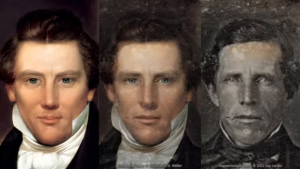Growing Up Mormon: The Story of Amy Adams

Introduction to Amy Adams
Amy Adams, an esteemed American actress, has captivated audiences worldwide with her exceptional talent and versatile performances. Born on August 20, 1974, in Vicenza, Italy, to American parents stationed there in the military, she spent much of her formative years in Castle Rock, Colorado. Growing up in a family that practiced the Mormon faith, her upbringing played an influential role in shaping both her character and career ambitions.
Adams discovered her passion for acting at a young age, participating in various school plays and community theater productions. Her early exposure to performance arts instilled in her a love for storytelling and a desire to connect with her audience emotionally. However, her journey towards superstardom began in earnest when she moved to California to pursue professional acting opportunities. Initially, she faced challenges typical of aspiring actors, including auditions and rejection, which tested her resilience.
Adams’ breakthrough came in 2002 with her role in the critically acclaimed film “Junebug.” This performance not only showcased her acting prowess but also earned her the first Academy Award nomination, establishing her as a notable talent in Hollywood. Following this, she continued to take on diverse roles, from the enchanting princess in “Enchanted” to the powerful journalist in “Spotlight,” each selection reflecting her evolving artistry and depth.
The influence of her Mormon upbringing remains evident in her work ethic and dedication to her craft. The values instilled during her childhood have significantly impacted her life choices and professional commitments. As she navigates her successful career in the film industry, understanding Amy Adams’ background within the Mormon faith adds a layer of complexity to her identity and contributions to the arts.
The Mormon Faith Explained
The Mormon faith, formally known as the Church of Jesus Christ of Latter-Day Saints (LDS), has a rich tapestry of beliefs, practices, and cultural aspects that significantly shape the lives of its members. Central to its doctrines is the belief in Jesus Christ as the Son of God and the Savior of humanity. Mormons hold that God continues to reveal His will through modern-day prophets, with Joseph Smith being regarded as the first prophet in this dispensation. This concept of ongoing revelation establishes a connection between the biblical teachings and the lived experiences of the church members.
A pivotal tenet of the Mormon faith is the emphasis on family. The doctrine teaches that families can be sealed together for eternity in sacred temples, offering a unique perspective on mortality and relationships. This focus on familial bonds often leads to strong interpersonal connections within the community. Moreover, members are encouraged to engage in family history work, contributing to a sense of belonging and continuity across generations. Family gatherings, community service, and faith-based activities reinforce these values, making the family unit a cornerstone of Mormon culture.
Another significant aspect of the Mormon faith is the emphasis on moral values and ethical living. Adherents are encouraged to follow a health code known as the Word of Wisdom, which advises against the consumption of alcohol, tobacco, and certain other substances. This commitment to health promotes an overall lifestyle centered around well-being and discipline. Furthermore, members participate in regular worship services, scripture study, and missionary work, which fosters a strong sense of community and purpose.
In essence, the beliefs and practices of the Mormon faith contribute to a distinctive culture that prioritizes family, community, and a moral framework, significantly influencing the formative experiences of individuals like Amy Adams.

Amy’s Early Life in Utah
Amy Adams was born on August 20, 1974, in Castle Rock, Colorado. However, her formative years were primarily spent in the suburbs of Salt Lake City, Utah, after her family relocated when she was a young child. Growing up in Utah, Amy was immersed in the culture and beliefs of the Church of Jesus Christ of Latter-day Saints, a community with a strong presence in the region. This predominantly Mormon environment played a significant role in shaping her early identity and aspirations.
Amy was born into a family that valued strong moral principles, community involvement, and artistry. Her father, a former member of the Latter-day Saints church, worked in various roles, while her mother, a homemaker, nurtured her children and supported their creative interests. The influence of her parents was profound; they encouraged her creativity, immersing her in theatre and music from a young age. This encouragement was indicative of a supportive home, which emphasized both education and artistic pursuits, reflecting the values often held in Mormon communities.
As a child, Amy participated in school plays and community theatre, which ignited her passion for performance. The close-knit societal structure of the Mormon community provided her with a sense of belonging, but it also posed challenges in balancing her burgeoning artistic ambitions with the values upheld by her upbringing. Despite the pressure to conform to certain expectations, Amy’s determination and talent eventually led her to pursue acting full-time after moving to Los Angeles upon graduating from high school. Her journey from the suburbs of Utah to the Hollywood stage serves as a remarkable testament to the resilience and adaptability she developed in her upbringing.

The Impact of Mormon Culture on Amy’s Values
The values instilled in Amy Adams during her upbringing in the Mormon culture have had a profound influence on her personal and professional life. Growing up in a community that emphasized the importance of family, Amy developed a strong commitment to her loved ones, which remains a cornerstone of her identity today. Her family-oriented mindset is not just a reflection of her upbringing but also a guiding principle in her life choices, advocating for a balance between her career and familial responsibilities.
The Mormon culture further shaped Amy’s work ethic, instilling in her the belief that hard work and dedication are essential components of success. She has often expressed that the discipline learned from her upbringing fuels her ambition within the competitive entertainment industry. This strong work ethic has propelled her career, allowing her to take on diverse and challenging roles, thereby contributing to her reputation as a versatile actress.
Moreover, the moral compass derived from her Mormon values guided her decisions in the world of Hollywood, an industry known for its challenges and temptations. Amy has consistently emphasized the importance of integrity and authenticity, which are key elements of her character. She has spoken about the necessity of staying true to oneself amidst external pressures, choosing roles that resonate with her principles rather than simply pursuing commercial success.
As a result, the influence of Mormon culture is evident in Amy’s approach to both her professional and personal life. It has equipped her with a resilient sense of self and the ability to navigate the complexities of fame while remaining anchored in the values she holds dear. This interplay of faith, family, and work ethic continues to manifest in her life choices, reflecting the lasting impact of her upbringing.

Struggles with Identity and Faith
Amy Adams’ journey as a professional actress intertwined with her upbringing in the Mormon faith highlights a complex narrative of identity and personal struggle. Growing up in a community that emphasizes certain values and expectations, Amy felt the weight of conformity pressing upon her. This tension became particularly pronounced as she pursued a career in acting, a profession often viewed with skepticism within conservative sects of the Mormon community.
The conflict between faith and ambition was not merely superficial for Adams. On one hand, her commitment to Mormon doctrines instilled a sense of belonging and community, but conversely, her aspiration to excel in a field that frequently prioritizes performance and personal expression clashed with traditional values. These pressures led her to question not just her career path but also her own beliefs. The desire to break free from the confines of her upbringing often materialized as a struggle against the expectations set by both her religious community and societal norms regarding success.
As she navigated the early stages of her career, Amy observed how her peers in the industry faced their own challenges, many of which echoed her feelings of doubt and uncertainty. The inherent conflict between adhering to the tenets of her faith and embracing the freedom of artistic expression became a defining aspect of her story. Gradually, Adams began to reconcile these differences, realizing that her identity could encompass both her career and her faith without completely abandoning one for the other. This ongoing personal journey serves as a testament to the complexities of navigating identity, particularly for individuals raised in environments with strict cultural and religious expectations.

Amy’s Breakthrough Role and Career Success
Amy Adams, renowned for her exceptional acting skills and captivating performances, achieved significant acclaim following her breakthrough role in the critically acclaimed film ‘Junebug’ released in 2005. In this defining performance, Adams portrayed the character of Ashley, a naive yet endearing small-town woman who navigates complex familial dynamics. This role marked a pivotal moment in her career, establishing her as a talented actress capable of capturing the nuances of emotional depth and complexity in her characters.
The film ‘Junebug’ not only earned Adams her first Academy Award nomination but also brought her work into the limelight, showcasing her ability to communicate authenticity and vulnerability. Her portrayal resonated with both audiences and critics alike, ultimately leading to more diverse and challenging roles in subsequent Hollywood productions. Following this breakthrough, she starred in various notable films such as ‘Enchanted,’ ‘The Fighter,’ and ‘American Hustle,’ affirming her status as a versatile leading actress.
Amy’s upbringing in a close-knit Mormon community has undeniably influenced her career choices and the roles she embraces. The values instilled in her during childhood often reflect themes of hope, resilience, and familial relationships in her filmography. Amy tends to gravitate towards characters that embody strength and complexity, mirroring her own life experiences and beliefs. This inclination towards well-rounded, relatable, and often morally intricate characters has allowed her to connect deeply with her audience while exploring a range of human emotions and experiences.
In many ways, Amy’s success story serves as a testament to her perseverance and dedication to her craft. Her ability to leverage her background and personal insights into her performances has helped her stand out in a competitive industry. Her journey from an aspiring actress to an Academy Award-nominated star exemplifies how embracing one’s roots can lead to remarkable achievements in the world of film.

Reflections on Mormonism in Amy’s Life
Amy Adams, renowned for her artistic prowess, often reflects on her upbringing within the Church of Jesus Christ of Latter-day Saints, commonly known as Mormonism. Throughout various interviews, she articulates the profound impact that her upbringing has had on her personal and professional life. While she has distanced herself from certain aspects of her religious past, the values instilled in her during her formative years continue to resonate in her current beliefs and practices.
Adams acknowledges the community aspect of her Mormon upbringing. She often speaks fondly of the strong support system and the sense of belonging it provided her during her childhood. This connection to community is something she holds dear, and it influences her interactions in the Hollywood sphere, where relationships are often modeled on authenticity and trust. In expressing gratitude for her roots, Amy illustrates that while her spiritual path may have evolved, the foundational principles of compassion and kindness persist in her character.
Moreover, Amy Adams delves into her feelings of identity and belonging, exploring how her Mormon heritage shapes her worldview. She respects the tenets of her upbringing but has also embraced a more inclusive and expansive perspective on spirituality. In public appearances, she speaks about the importance of personal discovery and the need to reconcile her past with her present beliefs. This balance reflects the journey many individuals undertake as they navigate the complex landscape of religion and personal identity.
Ultimately, Adams’ reflections on her Mormon background invite viewers and fans to consider the broader implications of faith, community, and the continuous evolution of belief systems in their own lives. Through her journey, she inspires both understanding and acceptance of differing paths within the exploration of spirituality.
Amy’s Advocacy and Philanthropy
Amy Adams, an accomplished actress known for her versatile roles in film and television, has extended her influence beyond the entertainment industry through various philanthropic efforts and advocacy initiatives. Rooted in her Mormon values, which emphasize community service, charity, and the importance of the arts, Adams has dedicated significant time and resources to causes that align with these principles.
One of the key areas where Amy Adams has made impactful contributions is in the arts. Recognizing the role that artistic expression plays in community development, she has actively supported several arts organizations, including the American Film Institute and local theater companies. Her advocacy for the arts is not merely about promoting creativity; it’s about fostering a sense of community and belonging, echoing the collective spirit encouraged by her Mormon upbringing.
In addition to her support for the arts, Adams is involved in various charitable activities aimed at assisting underprivileged communities. She has worked closely with organizations such as Feeding America and the Los Angeles Food Bank, where she has participated in fundraising events and awareness campaigns to combat hunger and poverty. By leveraging her platform, she raises awareness about social issues, drawing attention to the pressing needs of those in her community.
Moreover, her commitment to children’s rights and education is reflected through her efforts with charities like Save the Children, highlighting her belief in providing young people with the opportunities they deserve. Adams encourages initiatives that focus on empowering youth, consistent with her own values and the teachings of her faith. This holistic approach to philanthropy showcases her dedication to improving lives, fostering community spirit, and championing the arts, all of which are integral aspects of her identity as a member of the Mormon community.

Conclusion: The Duality of Faith and Fame
Amy Adams’ journey from a devout upbringing in the Mormon faith to becoming a celebrated actress encapsulates a fascinating narrative of duality. Throughout her life and career, she has navigated the intricate complexities that come from reconciling her religious background with the demands and influences of the entertainment industry. Growing up in a community characterized by strong moral values, Amy was instilled with principles that emphasized faith, family, and dedication. These fundamental beliefs have served as a foundation for her decisions, both personally and professionally.
Adams’ experiences in the Mormon faith have greatly influenced her identity, providing her with resilience and a strong sense of self, which are invaluable traits in a competitive field like acting. Despite the challenges of reconciling her beliefs with the often hedonistic nature of Hollywood, she has remained rooted in her values, allowing her to approach her roles with authenticity and depth. This authenticity resonates with audiences, contributing to her widespread acclaim and the ability to portray complex characters that grapple with issues of morality and personal growth.
Moreover, Adams’ path highlights broader themes of faith and identity. Many individuals who have been raised in strict religious environments often grapple with self-acceptance and the need to forge their own identities outside those confines. Adams’ success story provides a relatable narrative for those who seek to balance their upbringing with their aspirations. By embracing her unique background while pursuing her dreams, she has not only carved out a distinguished career but has also inspired others to confront the dualities in their own lives with grace. In navigating her faith and fame, Amy Adams exemplifies the power of self-acceptance and the importance of staying true to oneself in an ever-changing world.













Leave a Reply
You must be logged in to post a comment.